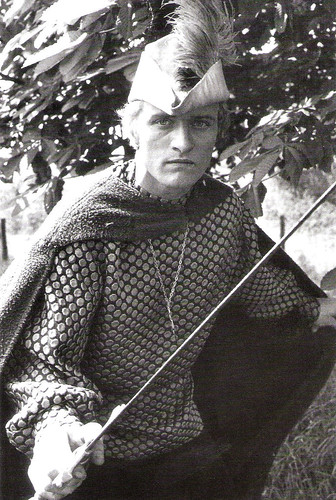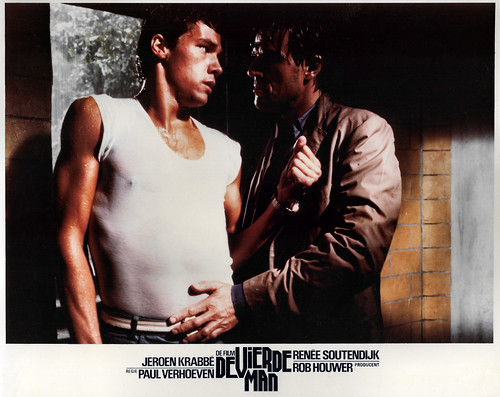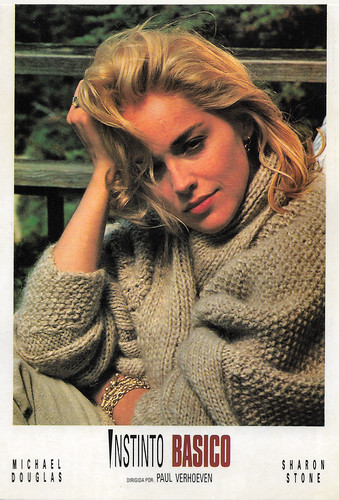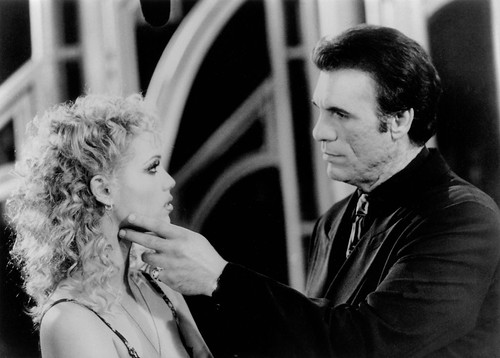
Vintage press photo. Gina Gershon and Elizabeth Berkley in Showgirls (Paul Verhoeven, 1995).
Did everything go well?
“I just got out of production. I filmed for seven months and now it still has to be finished. Things never go well with movies. It is war: it is about overcoming difficulties. If all goes well, something is clearly wrong. Then you take the easy way. a crisis is usually in the film's favour, because then you're walking on tiptoe."
During a survey, it turned out that Floris (1969) is the favourite youth series of our readers
“Oh, I would also have mentioned that series. Also because I don't know any other youth series. The fact that Floris has meant something to many people is evident from the fact that the series - in black and white - has been repeated so many times.”
They had also discovered 'understated eroticism' in the series
“When you let two men hang out, there is always subdued eroticism. Just like in Soldaat van Oranje/Soldier of Orange (1977). Whether that is an eroticism that takes place in the mind of the viewer or in the mind of the director or whether the two actors radiate it to each other, it is never entirely clear. I was more aware of this with Soldaat van Oranje than with Floris, but the situation of two men together offers the possibility of a hidden homosexual relationship.”

Dutch postcard by N.A.A., 2000. Photo: Rutger Hauer in Floris (Paul Verhoeven, 1969).
Did you use this in Soldaat van Oranje to suggest something that wasn't made explicit?
“Of course. In Soldaat van Oranje there is that scene, in which the protagonists have to meet again on that steamship after their flight from the Netherlands. Erik (Rutger Hauer) then has to shovel coal in the engine room and finds another man working there, Jeroen Krabbé. Then they fall laughing on the coals, while they are partially uncovered. Basically because of the heat, but there is clearly a second thought involved."
Why?
“I do not know. That's how I saw it when we played it. You don't need to know all that about yourself either, it actually doesn't play a major role in the film - and certainly not in Erik Hazelhoff's book. But I felt like it was something that could play into the story.”
Does that also apply to the tango of Rutger Hauer and Derek de Lint?
“That is indeed somewhat identical. It's a tango scene partly influenced by Bernardo Bertolucci's Il Conformista/The Conformist (1970). In it, two women dance the tango, with a clear lesbian component. I believe I saw that film for Soldaat van Oranje. It is also influenced by Some Like It Hot (Billy Wilder, 1959), in which two men dance the tango. A man is in cross-dressing and has a rose in his mouth. The scene is thus a reference to homosexual elements in other films. Homoeroticism plays a part in the youth group of Soldaat van Oranje. That is also inherent in how people are. In principle, everyone has the opportunity, whether you use it in life or only practice it in your mind.”

Dutch press photo. Toon Agterberg and Peter Tuinman in Spetters (Paul Verhoeven, 1980).
It's also in Spetters (1980)
“Sure, it's in four or five of my films.”
Suppose you could make a remake of Spetters in Hollywood. What would you do differently then?
“The only thing I would do differently is build up the way Eef (Toon Agterberg) handles his sexuality more slowly. It's developing too fast now. It is not possible in a lifetime, certainly not after such an extensive rape, to come to an understanding so quickly. That takes a few years rather than a few weeks."
Would an American producer accept that one of the main characters is gay?
“I think so... well yes, but then there must be something in return. I don't think they would take it easy if it was the main character. Or the only main character. I do think they can accept it in a wider context, like in Spetters. Whether they would like to produce a film like De Vierde Man/The Fourth Man (1983) is highly questionable. Or it should be comical. As long as you don't have to seriously think about it. In itself, thinking about homosexuality is stagnating. There is more and more agitation against things that seemed to be accepted. All kinds of things are reversed. There is clearly a regression to the acceptance of homosexuality in America."

Vintage press photo. Jeroen Krabbé and Thom Hoffman in De Vierde Man/The Fourth Man (Paul Verhoeven, 1983).
Could you’ve added a gay storyline to Starship Troopers (1997)?
“Very difficult. That is also due to the film, which exudes a kind of puritan spirit. a fascist society is outlined. Fascism and homosexuality have of course never been friends. It was outside the theme of the movie unless you had used it as a drama element. It's not about people having inner dramas, but about a fight with giant insects. In America, homosexuality almost never appears in scripts. You can work it in as long as you keep it in the background."
In Flesh + Blood (1985), I thought, it was well done
“That was of course not an American film, but a Dutch film with partly American money. There screenwriter Gerard Soeteman could write whatever he wanted. At that time, in the 1980s, tolerance in America was also higher. It seemed to develop in such a way that homosexuality would become more and more accepted. Clinton, of course, also misjudged this when he wanted to make homosexuality acceptable in the army in the first weeks of his presidency. That was seen by the military as an attack on their sacred statutes. I think it put Clinton years behind. When I use homosexuality in my films, I usually don't want to use it as a theme. In De Vierde Man, it is dramaturgical but not thematic material. In it, you have a different triangle than normal. You get a different dramaturgy when you have a woman with two men, and you discover that those two men actually want each other. That's what I think is the nice and important thing about it: using homosexuality as a dramatic element without worrying about the theme. You're actually saying that it's normal."

Spanish postcard by Novograf. Photo: Sharon Stone in Basic Instinct (Paul Verhoeven, 1992).
That also applies to Basic Instinct (1992)
“Precisely. They were even angry about that. Is it morally acceptable? Dirty, crazy, or strange? Those questions are all swept away by considering it purely as dramaturgical material. It also has something more powerful than going to defend it. Everyone here in America is always pro-gay or anti-gay. That Basic Instinct uproar was totally ridiculous because the gay community didn't understand what I meant: 'It's so normal that I don't have to say a word about it.' That only became clear to everyone when the film came out. Then all the protests were immediately over."
Is homosexuality still a taboo in Hollywood?
“I don't believe a movie star can claim to be gay right now. After all, in the cinema, you are dealing with mainstream society. The studios still work with the idea that the stars have to sell a film. That's why they don't want those stars to be placed in any way in a light that repels the conservative part of America. Thus, any homosexual behaviour of an actress or actor is kept out of the public eye. Something else comes to mind. Why I actually project more into the gay relationships in Showgirls (1995) and Basic Instinct than into the heterosexual one is because it's sometimes easier to put emotion and poignancy in controversial situations than in ordinary ones. It is actually the same as the relationship in Soldaat van Oranje between Erik (Rutger Hauer) and his friend Alex (Derek de Lint), which has more warmth than many other relationships. Erik accepts Alex in his different thinking. By bringing two people with different perspectives to each other, you break through barriers. If you break through an extra barrier by letting love resound in a scene between two women or two men, it is more moving. As an artist, you can sometimes work better when things are against the grain. You break expectations. Erik is expected to distance himself from Alex when he joins the SS. Breaking through it gives a kind of emotion that allows you to express yourself more freely. The same goes for all controversial things in life. And homosexuality is - especially in this country - controversial. With Showgirls you expect Nomi (Elizabeth Berkley) to be interested in a man, but no, he is interested in a woman. That actually opens up the audience. That space is there so suddenly that as an artist you get the freedom to project in it."

Vintage press photo. Elizabeth Berkley and Robert Davi in Showgirls (Paul Verhoeven, 1995).
The American public did not like it that way
“No (laughs). I have no idea what happened to Showgirls. The girl is of course quite aggressive. The breaking of the female pattern was apparently not favourably received. Plus, there was no holding on to a trusted star like Michael Douglas in Basic Instinct. The viewers had to identify with Showgirls with a female protagonist who is aggressive and who exhibits a behaviour that they reject in principle - in all their hypocrisy, of course. So this whole film was basically anti-identification."
Text: Paul van Yperen, 1996.
No comments:
Post a Comment